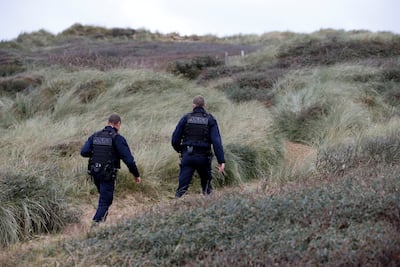Calm weather may have prevailed over the shipping lanes that are a hub of mariners engaged in global trade, and the voyagers looked across a strait so narrow that the naked eye can see the English coast from France.
But that did not compensate for the lack of soundness of the vessel that was put into the waves. By the time the deflated dinghy was spotted in the English Channel, surrounded by motionless bodies, it was too late to save most of those who had set to sea just minutes earlier.
Wednesday's tragedy was a stark reminder of the perils faced by the thousands of migrants who have crossed this year, their fate in the hands of smugglers who often supply substandard means to make the journey to English shores.
At least 27 people died after their dinghy capsized off the French coast, bringing a tragic end to the dream of those who sought a new life.
Olivier Faure, an MP in northern France, said many of the victims were Kurds, news which was met with horror by Kurdish representatives in the country.
The dead included 17 men, seven women — at least one of them pregnant — and three children. Two people, one from Iraq and one from Somalia, were pulled alive from the Channel.
Their inflatable boat was, in the words of France’s Interior Minister Gerald Darmanin, no more than a garden paddling pool, overcrowded with people desperate to reach the UK.
The group entered the water between Calais and Dunkirk at France’s northern tip, a process which can take as little as five to 10 minutes.
That very morning, French police said they had foiled two attempts to enter the Channel, confiscating two boats, two motors, some fuel and some paddles.
However, the doomed dinghy made it into the Channel — a policing failure with explosive political ramifications.
While the summer is typically favoured by migrants, this year’s crossings have stretched deep into the colder months. Conditions on Wednesday were dry, and the wind was no stronger than usual.
But the flimsy vessel was at the mercy of the waves, the busy shipping traffic, and was overloaded with passengers.
It had made it only a short way into the 35-kilometre crossing to Dover when it lost air and began to take on water.
What caused it to deflate has yet to become clear. One report in French media suggested a container ship had struck the dinghy, but an English fishing captain said he saw no nearby boats on his radar.
By the time another fisherman raised the alarm at 1pm UK time, having spotted 15 people floating motionless in the water, it was already too late.
The distress call led to a search by three French boats and three helicopters.
French lifeboat worker Charles Devos described seeing a “flat, deflated inflatable boat with the little air that remained helping it float”, surrounded by the bodies of those who had drowned.
“At sea, it was dramatic. There were bodies floating, it was very, very, very shocking. So, we recovered all the people we saw on board,” he said.
Britain said it had sent a helicopter to join the search and rescue mission, which was called off after darkness fell.

The bodies pulled from the water were returned to the French coast, where post-mortems got under way late on Wednesday.
The head of a French aid group, Maya Konforti, said it would be a complicated task for humanitarian workers to identify victims, contact families and repatriate bodies.
“When it’s one or two people, it’s manageable,” but with 27 people, “we don’t know how we’re going to do it. It will be very, very complicated and it will also be very, very expensive,” she told French television.
The two survivors, who an Iraqi and a Somalian, were being treated for hypothermia, but it was unknown when, or what, they could tell investigators.
By this time, the suspected traffickers behind the fateful journey were already being hunted down, with France pointing the finger at smugglers who bring people to the coast via Belgium, the Netherlands and Germany.
Five people were arrested, including one with a car registration in Germany, where he was thought to have bought inflatable boats.
But with political leaders going into battle to bring down the smuggling networks, the short, fateful journey’s ramifications are only just beginning.















